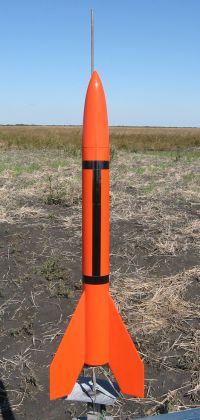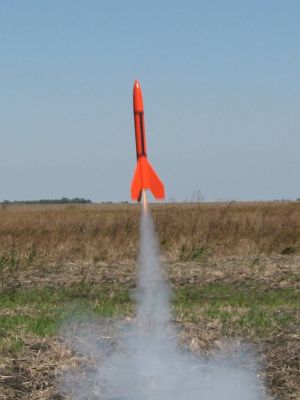| Construction Rating: | starstarstarstarstar |
| Flight Rating: | starstarstarstarstar |
| Overall Rating: | starstarstarstarstar |
| Manufacturer: | Hawks Hobby  |

Brief:
I was provided with my Mark 305 for beta testing. As the name implies, this is a “super” upscale of the old
Estes Mark. Although the interchangeable motor mount included in the kit is designed for a single 24mm motor, you can
get additional motor mounts that provide a variety of options for clusters or bigger motors depending upon the weight
you add to the nose. A spacer is included in the interchangeable motor mount kit to allow the use of either Estes D or
E motors, and the rocket recovers on a very nice 24-inch rip-stop nylon parachute. The rocket is over 28 inches tall
and weighs 8.6 ounces with standard completion.
Construction:
The main body tube is a big 2.34 inches in diameter and is slotted for the three fins, which are laser cut basswood.
Very nice! The big balsa nose cone was top quality as well and very smooth. The 24mm motor mount has a unique rotating
design that locks it in for flight and can then be rotated out to interchange with a different motor mount. The
centering rings are laser-cut light-ply and a 3.75” engine hook is provided for motor retention. A CR2050 kraft
ring is used for the thrust ring. A Kevlar®/3/8”
elastic shock cord combo is included along with two big launch lugs, one 3/16” and the other 1/4”, and a
hefty eye screw. A baffle assembly is included which uses offset tubes attached to centering rings, and it actually
works! Trim Monokote is provided for applying the black stripes on the model.
The professional look of a Hawks Hobby kit and the quality of parts has always been superb, but now I think the quality of the instructions has caught up. The pages were all stapled together which is a big plus in my book, plus the text aligned well on the pages and the accompanying illustrations were very clear and plentiful. I modified the construction of the motor mount to allow installation of the engine hook using my standard method. Here’s the link on EMRR’s tip page for the general idea.
This method allows positive motor retention while not having to worry about the hook getting in the way of the delay element when using the AeroTech reload motors. It aligned perfectly with the upper centering ring so no real modifications were required, and it didn't interfere with the “lock” design. I used a Dremel to trim the upper end of the motor hook to be level with the top edge of the centering ring. The instructions indicate to attach the Kevlar® cord by wrapping it around one of the baffle tubes and inserting the end through a small hole in the upper centering ring, and then attaching the elastic cord to a loop at the end. However, I used my standard tri-fold shock cord attachment to allow inspection of the shock cord although the baffle makes that almost unnecessary with this kit. To minimize abrasion from the Kevlar® against the body tube, I soaked in CA around the top 1/2" of the body tube and tied a knot in the Kevlar® to meet the lip of the body tube.
The fins attached very nicely to the rocket, aligning perfectly with the slots in the tube. After making sure the fin was aligned properly, I applied a small amount of CA at each end to hold it in place before moving on to the next fin. Since the centering rings are slotted to slide up the tabs on the fins I smoothed in JB Weld for the fillets, as I didn't want to worry about epoxy draining down onto the tabs and interfering with the insertion of the motor mount. Glue on the launch lug, install the screw eye into the nose cone (adding weight first to compensate for the largest motor you plan to fly), and attach the shock cord and you’re almost done. The launch lug is glued on next to and at the top of one of the fins. I decided to use the 3/16” size and save the 1/4” for something more heavy duty. The parachute was already assembled and had small grommets holding the shroud lines; it's a very nice parachute.
Finishing:
The balsa nose cone required very little finishing. With only a very light coat of Elmer's Light Fill ‘n'
Finish, the nose cone was very smooth. Only a light coat of filler was also needed on the fins as the basswood was very
smooth after sanding with 400 grit sandpaper. The body tube was the only thing that required any significant
effort-–darn spirals! After using Fill ‘n' Finish to fill those and much sanding, I sprayed the entire model
with a light coat of Kilz to seal off the glue and provide a solid base coat. Next, I lightly sanded the entire model
with 240 grit sandpaper and then sprayed on a coat of primer. Next, sand and primer, and sand and primer again, sanding
with 400-grit sandpaper. I painted the entire model with Valspar’s Restoration Series Allis-Chalmers orange and
after drying for a couple of days applied the Monokote trim. Wow! Even my wife was impressed. She said, “That one
looks like a real rocket.” I put a thick coat of Future Floor Finish on the painted surfaces to protect
everything.
Construction Rating: 5 out of 5

Flight and Recovery:
First flight was on an Estes E9-4 with the wind speed steady at about 5-8 mph. I didn't put any wadding in it and
there was only a slight ejection residue noticeable on the parachute after recovery. The flight was perfect although
ejection was a little early so I decided to use a six second delay on the next flight. Unfortunately, the wind speeds
had increased to between 8-12 mph with occasional strong gusts. A gust of wind caught the big fins a few feet off the
launch rod sending the rocket up about 40 degrees from vertical. The model was already headed down ballistic when the
nose cone ejected, ripping the shock cord out and pulling three of the grommets out of the parachute. The body tube
caught the nose cone, slicing a huge chunk out of it, and the shock from the impact of the tube into the ground
shattered the centering rings, probably because of a slight play in the fit of the centering rings. Fortunately, the
ground was still soft enough that the body tube was undamaged. She’ll be ready to fly again as soon as I repair
the nose cone and parachute and add new centering rings on the motor mount.
Flight Rating: 5 out of 5
Summary:
The Mark 305 is a fantastic rocket. The kit is very easy to build and the interchangeable motor mount provides the
modeler with a variety of motor options. The large fins do mean you’ll need to fly it in lower winds unless a
motor with a higher initial impulse is used. The 24 inch rip-stop nylon chute is perfect for recovery, and I love the
fact that I don't have to use recovery wadding!
Overall Rating: 5 out of 5
 |
 |
Flights
 |
 |